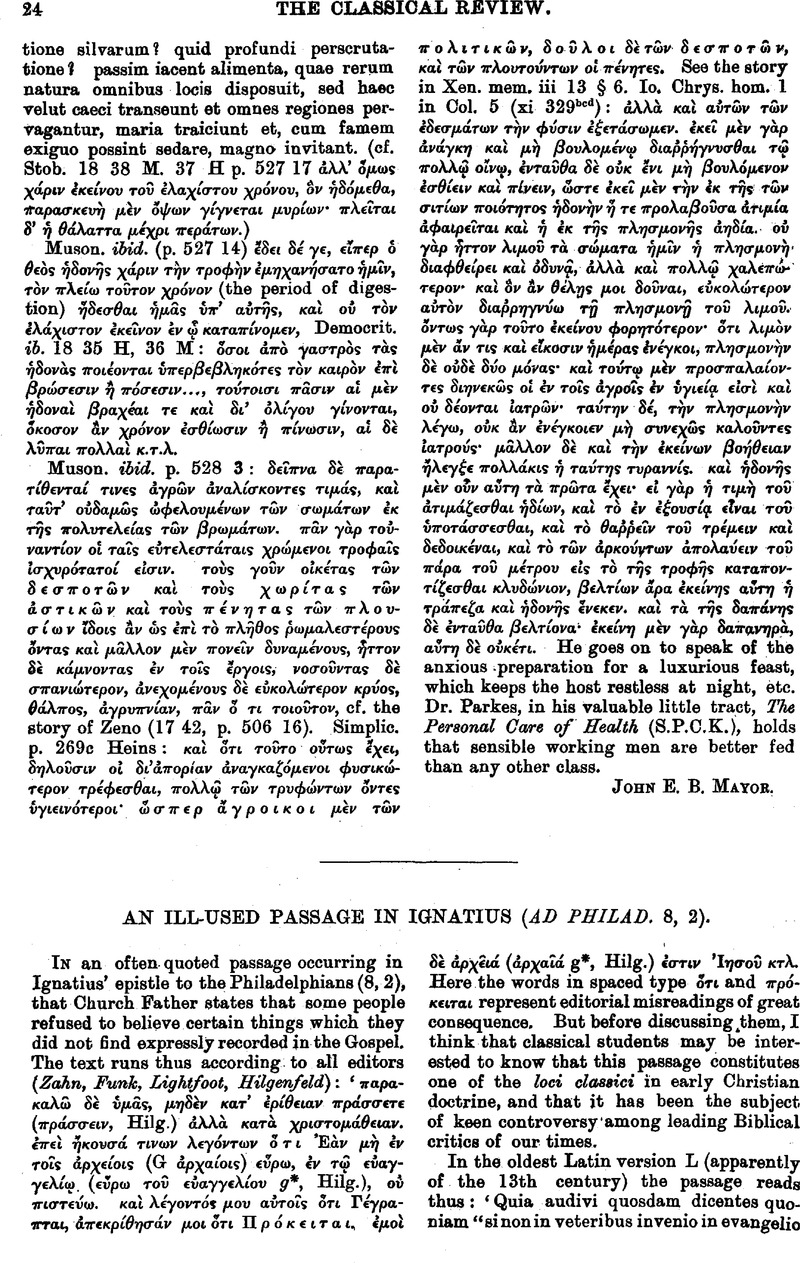No CrossRef data available.
Article contents
An Ill-Used Passage in Ignatius (Ad Philad. 8, 2)
Published online by Cambridge University Press: 27 October 2009
Abstract

- Type
- Original Contributions
- Information
- Copyright
- Copyright © The Classical Association 1903
References
page 25 note 1 Both Lightfoot in his Apostolie Fathers (London, 1885) vol. ii, i, 270–273Google Scholar, then in his The Apostolic Fathers (1891) p. 126Google Scholar,—and Th. Zahn in his Patres Apostolici, ii, 78Google Scholar, then in his Geschichte des neutesta-mentlichen Kanons, vol. i. (Erlangen, 1888) p. 846, and vol. ii (1892) p. 945Google Scholar, agree in the reading of the passage :  but they disagree in its interpretation, Zahn translating: ‘Denn ich hörte gewisse Leute sagen: Wenn ich es [but what ?] nicht in den Urkunden finde, nämlich im Evangelium, so glaube ich es nicht. And da ich ihnen sagte : Es [What ?] steht geschrieben, antworteten sie : Das ist die Frage. Mir aber ist Urkunde Jesus Chvistus’ U.S.W.—while Lightfoot still less correctly renders the passage thus : ‘For I heard certain persons saying : “If I find it [what ?] not in the charters, I believe it not in the Gospel.’ And when I said to them, “ It is written” they answered, “That is the question.” But as for me, my charter is Jesus Christ' etc.—Zahn, then, in order to refute Lightfoot, reverts to the subject and discusses it in a special chapter of four pages (Geschichte des neut Kanons (ii, 945—8), defending his own interpretation as given above. Involved in this controversy, A. Hilgenfeld in his recent edition lgnatii Antiocheni et Polycarpi Smyrnaei epistulae et martyria (Berlin, 1902), says in a very long comment (pp. 298–300) on the passage : ‘Ignatius audiverat aliquos dicentes : ‘Nisi in veteribus [reading ν τος ρχαοις, as indicated above] (in Veteris Testamenti libris) invenero, in evangelio non credo.’ Ignatius dixit: ‘Scriptum est’ (vet, scripta sunt), sc. in ipso evangelio, cui iam divinae scripturae auctoritatem vindicavit. illi responderunt : ‘Quaeritur,’ sc. verene scriptum sit vel in divina scriptura doceatur (aliter Ign. II.
but they disagree in its interpretation, Zahn translating: ‘Denn ich hörte gewisse Leute sagen: Wenn ich es [but what ?] nicht in den Urkunden finde, nämlich im Evangelium, so glaube ich es nicht. And da ich ihnen sagte : Es [What ?] steht geschrieben, antworteten sie : Das ist die Frage. Mir aber ist Urkunde Jesus Chvistus’ U.S.W.—while Lightfoot still less correctly renders the passage thus : ‘For I heard certain persons saying : “If I find it [what ?] not in the charters, I believe it not in the Gospel.’ And when I said to them, “ It is written” they answered, “That is the question.” But as for me, my charter is Jesus Christ' etc.—Zahn, then, in order to refute Lightfoot, reverts to the subject and discusses it in a special chapter of four pages (Geschichte des neut Kanons (ii, 945—8), defending his own interpretation as given above. Involved in this controversy, A. Hilgenfeld in his recent edition lgnatii Antiocheni et Polycarpi Smyrnaei epistulae et martyria (Berlin, 1902), says in a very long comment (pp. 298–300) on the passage : ‘Ignatius audiverat aliquos dicentes : ‘Nisi in veteribus [reading ν τος ρχαοις, as indicated above] (in Veteris Testamenti libris) invenero, in evangelio non credo.’ Ignatius dixit: ‘Scriptum est’ (vet, scripta sunt), sc. in ipso evangelio, cui iam divinae scripturae auctoritatem vindicavit. illi responderunt : ‘Quaeritur,’ sc. verene scriptum sit vel in divina scriptura doceatur (aliter Ign. II. ![]() . Ignatius asseruit: ‘Mihi vetera Iesus Christus,’ etc.… interpretationem meam deridens Zahn, quern Lightfoot non secutus est, post ν τῷεὐαγγῳ comma posuit, ut hie sensus efficeretur: Quoniam audivi quosdam dicentes: ‘Nisi in monumentis litteris conscriptis [pro: in tabulariis’ invenero, i.e. in evangelio libro, non credo,’ etc.
. Ignatius asseruit: ‘Mihi vetera Iesus Christus,’ etc.… interpretationem meam deridens Zahn, quern Lightfoot non secutus est, post ν τῷεὐαγγῳ comma posuit, ut hie sensus efficeretur: Quoniam audivi quosdam dicentes: ‘Nisi in monumentis litteris conscriptis [pro: in tabulariis’ invenero, i.e. in evangelio libro, non credo,’ etc.
page 25 note 2 It is well known that δς ν for ὂς ἂ is very common in post-classical and Biblical texts.




